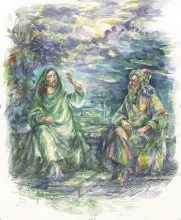
This principle of reaching people where they are was the foundation of the IBT seminar on Scripture Engagement in summer 2015. Be it for better or for worse, the times when common people argued about theological concepts in the streets or marketplaces of Byzantium are gone. In our era of high speed and high technology people have plenty of choices and plenty of entertainments. Very often, even if they are seeking for truth in the depth of their hearts, they may not realize this with their minds. To let people know about new Bible translations and to help them feel interested is a big task that requires time, effort, imagination, knowledge, humility and a truly self-sacrificial aspiration to do the Lord’s work in today’s world.
Representatives of 11 people groups of Russia and the CIS took part in the Scripture Engagement seminar. The aim of this workshop was to provide participants with the tools necessary to arouse their society’s interest in the Bible in the language that is most convenient for that society. Participants discussed the question of how to distribute Bible translations in the most acceptable form for their audience (printed, digital, video, audio, animation, storytelling, and so forth). This time the IBT seminar was not so much for the translation team workers, but more for the users of already translated Bible texts. These are people who see their life calling in helping others to hear the message of the Bible. What is their “Areopagus” in each specific case? How will they be able to implement the ideas encountered at the seminar and what are they already doing on their own initiative? Let us listen to the unique stories of three seminar participants who represent three Turkic languages – Altai, Crimean Tatar, and Tatar.


Tatar participant: “Once several brothers in Christ from our church were invited to visit an elderly lady who had fallen down and hurt herself badly. She needed somebody to comfort her because she had terrible pain and could not even sleep at night. Our brethren brought an IBT Gospel in Tatar with them and suggested that she should read this book, but she woman said that as Muslims neither she nor her relatives were allowed to read Christian Scriptures. Right on the spot one of the brethren was inspired to ask whether it was allowable for him to read this book aloud to her. “Why not?” she responded. “You may certainly read it.” So he started reading all the passages where Jesus healed people. Afterwards, he asked the elderly lady whether they could pray for her, and she gladly agreed. After that prayer she slept peacefully for the whole night, and soon after eagerly started to pray on her own. Christians continued visiting her, and each time they came, she immediately asked her relatives to bring a scarf to cover her hair and then initiated fervent prayer. Some time passed and she became interested in hearing about the whole life of Christ, and on this request the Gospel was read to her. She felt that she was a sinner and confessed her sins. She lived a year and a half after her first contact with Christians, and died peacefully the next morning after inviting some sisters in Christ from the same church to participate in her heartfelt prayer in Tatar. The relatives of that elderly woman asked Christians to continue visiting them whenever they are somewhere near their village. This is how intercultural bridges are built through Biblical texts.”
All these three short interviews are based on oral Scripture use. They all show how God inspires His servants with the most unexpected ideas, when they are not afraid to offer Him their voices. In the time of the Apostles the Scripture was always read aloud, since people had not yet initiated the custom of silent reading. Maybe in this era of new technology we are once again entering a time when “faith comes by hearing, and hearing by the word of God” (Rom 10:17).
IBT Russia/CIS is a non-profit organization financed through contributions from individuals, sponsoring organizations and foundations.
You can donate to IBT:
Through: AO UniCredit Bank, Moscow
SWIFT: IMBKRUMM
In favour of: Institute for Bible Translation
Address: 119334, Russia, Moscow, Andreevskaya nab. 2
TIN (INN) 7736231521
9-digit Bank identification code in Russian banking system: 044525545
Account no. (IBAN):
634261 USD 4020 02 001 or 40703840700010142881
634261 EUR 4020 02 001 or 40703978700010366720
634261 GBP 4020 02 001 or 40703826600010366723
Through: NOSTRO ACCOUNTS OF AO UNICREDIT BANK, MOSCOW:
USD JPMORGAN CHASE BANK N.A., NEW YORK SWIFT CODE: CHASUS33
EUR UNICREDIT BANK AG (HYPOVEREINSBANK) , MUNICH SWIFT CODE: HYVEDEMM
EUR UNICREDIT BANK AUSTRIA AG, VIENNA SWIFT CODE: BKAUATWW
EUR UNICREDIT S.P.A., MILANO SWIFT CODE: UNCRITMM
GBP THE ROYAL BANK OF SCOTLAND PLC, LONDON SWIFT CODE: RBOSGB2L
Important! In the field "designation" write "CHARITY DONATION"
For more information address IBT
You may sign up to receive our Russia/CIS monthly English newsletter here
